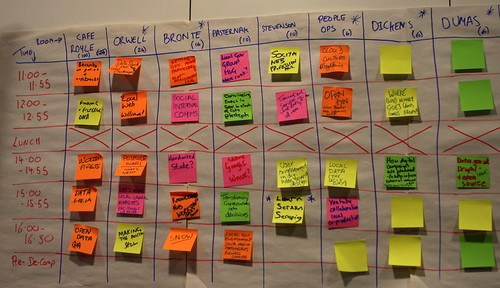Get posts sent to your inbox:
That was the ukgc10 that was

Flickr photo credit: Paul Clarke
Blimey.
The third annual unconference, or GovCamp, for government types went pretty well. Two main factors, marvellous and generous hosting by Google, and a terrific level of participation from pretty much everyone who attended. What’s more, nearly everyone stayed til the end!
Massive thanks to the other sponsors, including Huddle, Opportunity Links, Learning Pool, Boilerhouse, IDeA, Polywonk, Timetric, the Dextrous Web and probably others.
Huge props too to Tim Davies and Lloyd Davis for organising the agenda setting bit of the day – it really helped everything go smoothly.
Highlights for me were the sessions of getting internal communication and collaboration right – which resulted in the prospect of a spinoff event dedicated to these issues – and a session on discussing innovation in public services.
As always, how do we follow up on all this goodwill and enthusiasm? Let’s try by:
- sticking around the online community set up mainly for the event, but which has pretty much everyone signed up to it.
- Don’t forget that there is also the Teacamps – afternoon meetups in central london for government types. The next one is on the 3rd February in the cafe at the top of the House of Fraser on Victoria Street.
- A simple wiki is available for people to add content from the sessions they ran and attended, so those that missed them (or indeed the whole event) can still find out what went on
- Finally – the growing movement of ‘camps in and around government just goes to show that organising events that are useful, interesting and fun doesn’t need to be expensive or difficult. There’s nothing at all stopping you from organising your own, and there are plenty of people willing to help.
There’s lots of coverage online already, and will be more, I’m sure. I’ll keep the following list as up to date as I can:
- The event tumblog (thanks to BIS’s Al Reid for getting this going)
- Lots of photos on Flickr, including some lovely stuff from Paul Clarke
- Steph blogs about his session on the sustainability of digital engagement
- Neil got his notes up quicker than anyone, I think
- Kevin Campbell-Wright: Three Cs – Community, Crisis, Communications – My roundup of UKGovCamp10
- Sharon O’Dea is blogging loads of stuff. So far: a general post, and one about the session on web professionals
- Sarah Lay summarised the whole day rather nicely
- Mark Watson posted a very thorough overview of the day
- Paul Clarke’s post about his Hardwired State innovation process is here
- Anthony Zacharzewski on making the political sell
- Clare White is wonderfully comprehensive
- Graham Lally tells us about the sessions he attended
- Michele Ide-Smith blogs about the day, including the slides from her session on engagement with local communities
- Shane Dillon on Google Wave
- Peter Olding’s blog of the day…
- Robin Grant’s write up
David Wilcox grabbed Jeremy Gould and I before we left. It was Jeremy who kicked off this whole thing two years ago, and it’s been a privilege – as well as a pain in the arse – to have picked things up this year. Had Jeremy not stuck his neck out back then, we wouldn’t be where we are today. Anyway, enough brown nosing, here’s David’s video:


